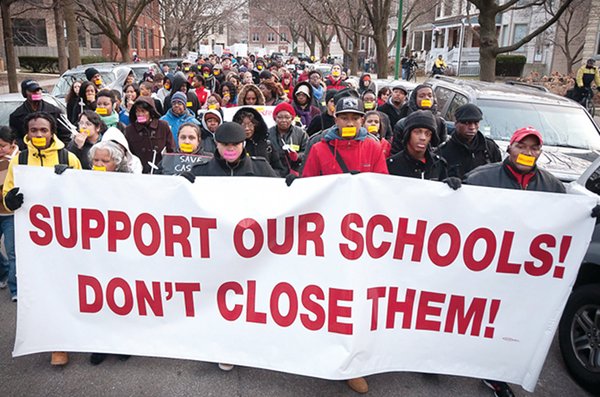
When the Chicago Teachers Union (CTU) voted to end their strike, teachers around the country applauded their accomplishments. The union had resisted the corporate austerity reform program. It developed an unprecedented unity among teachers and working class parents and students. Not merely a feel-good moment, it marked a step in the process from social awareness to class consciousness. But there was a more somber message.
The strike struggle was hemmed in by a thousand legislative strings, limiting bargaining to compensation issues. On the picket lines, teachers talked of the mayoral threats, recognizing that any gains won in the contract would be jeopardized by school closings, turnarounds, and opening more charter schools. Before ink was even applied to sign the contract, Mayor Emanuel told the media he would be forced to close upwards of 100 schools to pay for the contract concessions.
On October 30, 2012, schools CEO Barbara Byrd-Bennet, announced that only “under-utilized” schools would be subject to closure. She also got the state legislature to extend the December 1 deadline for listing the actual schools to be closed to March 31, 2013. She then appointed a commission, chaired by former energy corporation CEO Frank Clark, to hold hearings to get public input about school closings. The CTU opposed the extension because parents, students and teachers would not know until summer where their children would be going to school or whether teachers still had jobs. In a series of hearings in different neighborhoods, Bennet’s commission got a unified answer. If Bennet and the school board has any intention of taking into account the response of the community, as union organizer Martin Ritter pointed out, that message is no school closings, stop the expansion of charter schools!
The city has escalated its campaign. Byrd-Bennet says one fifth of the classrooms are empty. She has proclaimed that not all schools have arts programs because the resources are stretched thin across too many schools. Consolidating schools would solve the problem, Bennet says, of having 140 schools without libraries.
Here’s the story behind the story: schools with empty classrooms also have classes with too many students; charter schools draw students from neighborhood schools; the destruction of public housing has driven out thousands of residents; and yet there is one social worker for every 1,100 students. These are issues of common concern. Taking away our education birthright and our jobs makes it clear that we are part of a dispossessed group of the working class for whom capitalism no longer has any use.
On November 2, ten people were arrested as teachers and community groups sat in at City Hall protesting the school closings threat. On December 8, the Grass Roots Education Movement coalition held an education summit and rededicated itself to its own escalated campaign.
The fight against school closings is part of a war to maintain public education and achieve world class public schools in every neighborhood. The process is building class unity around what kind of education is possible and necessary.
